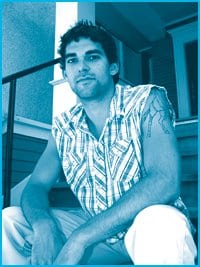When asked if he’s ever been gaybashed, Alex Doerr’s initial reaction is to say no, but then he reconsiders.
“It’s tough, there’s degrees of gaybashing. I remember in high school I had a football thrown at my car by the captain of the football team, but I’ve never been physically assaulted.”
Definitions are important, says Doerr, who is the victim services worker at The Centre. “The Centre’s definition of gaybashing is any sort of harassment, including verbal,” he notes. His job is to refer people who have been bashed, or victimized in other ways, to every imaginable agency.
He calls it “working the network,” but it’s really about reaching out to people who need emotional support. “I can assist people when they don’t even know they have some options sometimes-anything from losing your job and needing help finding job services, or training skills, to housing, legal or shelter issues.” He deals with same-sex domestic violence, eviction notices, coming out groups “or finding coverage if someone finds they’re HIV-positive.”
Summer is “bashing season” in the city, Doerr notes. It’s predictable: there is an increase in the number of violent incidents between May and September. “It’s frightening that there’s a season for it but we just see the numbers. We see a lot of people from the suburbs come in. More people are out at night and are usually drinking.”
Still, not everyone who’s been bashed reports it.
“Part of the problem is that the statistics aren’t reflecting the number of incidents that we know are occurring. My statistics at The Centre are low,” he frets, “and it may be that people don’t need me at victim services-that they’re dealing with it themselves, but I find that to be a very hard-to-believe reality.”
Above all else, and statistics aside, the 23-year-old believes that “reporting is also standing up and saying that this [gaybashing] is not tolerated. We do have a bad history with the police and we do have a bad history reporting things-and we are victims of crime,” Doerr says.
If people are afraid of the repercussions of reporting, Doerr has another option up his sleeve. “There’s something called third-party reporting which I can also do. Even if you don’t want to follow through with it, I can call in as the third party reporting and it raises the statistics. That’s important because it has funding, staffing, and new programs attached to it. If you are the victim of a bashing, an assault or anything that you feel is directed at you because you are LGTB, it’s important to call those in to the police because they record it.”
Working at The Centre, Doerr says the stress is high and the funding a perennial challenge.
“We need a full-time paid position here,” he says. The Centre is lobbying for it “but we need the statistics to give a valid reason for the ministry to give us the money. Burnout is very high in this field. I think the average time is two years.
And yes, he nods, “you take it home with you. I think it’s impossible not to, but you have to find ways to deal with it. I run. And I take a hot bath. It’s nice to just lay in the bath and think about the day.”
Still, the work is really rewarding. “It is really nice to be able to give back in this way. It only takes one thank you,” he smiles. “You just need that one person, even on the last session to just say, ‘thank you so much,’ and that makes the job worthwhile.”
*Doerr is available at The Centre, 1170 Bute St, on Mondays between 12-2 pm. For more info call: 604.684.5307 or 1.800.566.1170. The service is offered through a partnership between The Centre and the BC Society for Male Survivors of Sexual Abuse.

 Why you can trust Xtra
Why you can trust Xtra


